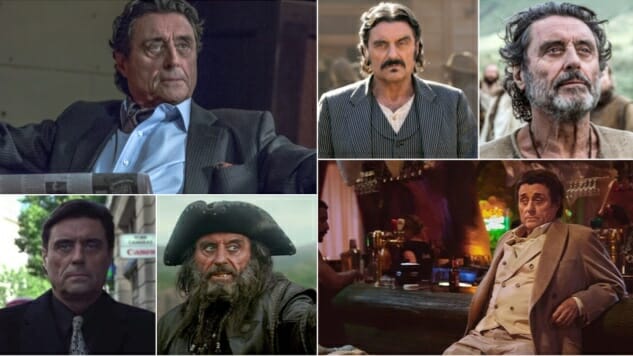
If you have a role where you need someone to drop out of the clouds and take over the screen like it’s a coup d’état, you probably want Ian McShane.
When you need a certain irascible quality—a big-hearted curmudgeon kind of thing—or a particular stealthy luminousness. Or a weird cockiness. When you need roguish charm, or a charismatic antihero, you need Ian McShane.
McShane is not a big guy but he completely fills up the screen. When he talks, you pay attention to every word, but he can say more with a sidelong glance than a lot of people can with a soliloquy. (He’s pretty good with a soliloquy, too.) Master of the glassy thousand yard stare, god of the blunt and unadorned, patron saint of foul-mouthed, five-o-clock shadowed grinning badass bad guys-he’s played gangsters and gods and Judas and Heathcliff, but as varied as his roles have been, they contain a hallmark vein of canniness and command. There is a gravitational pull to Ian McShane that’s as strong as it is strange. Maybe it’s his penetrating gaze, or his jack-o-lantern smile, or his voice that sounds like it should be coming out of a much larger man; maybe it’s something less quantifiable like confidence or charm or humor. In American Gods he makes a wonderfully gritty, epically world-weary and inescapable Odin. In Sexy Beast he plays a gangster named Teddy whose face is the visual equivalent of a Jackie Wilson high note—barely containable, something almost overflowing its vessel, with a stare that seems like it’s about to rupture his eyeballs and break loose. As Deadwood’s Al Swearengen, he exudes a hyperobservant, vulgarity-spewing authority that is by turn hilarious and unsettling. He carries with him an inescapable locus of gravity no matter how small the part and no matter what else is going on in the scene. Ian McShane could saunter through the middle ground of an epic battle, doing nothing in particular, and he’d still draw the eyes of most viewers.
Even in Game of Thrones, where he has all of three scenes, he is a standout, perhaps the strongest one-episode character in the series. As anti-violence septon Ray in season six’s “The Broken Man,” he gives a good-natured and emotionally honest soliloquy about trying to make amends for past misdeeds, and turns his large green eyes onto Rory McCann’s Sandor Clegane as he says, “It’s never too late to come back.” The voltage that passes between the two men is pretty incredible—McShane’s grounded, earthy frankness, and McCann’s barely daring to believe there might be redemption for him, and even friendship. It’s masterful.
Ian McShane is all about density. You look at him and get the sense that his 5’ 9’’ body weighs a lot more than it appears to; it’s as though he were carved from basalt. He manifests power in stillness, a been-around-the-tracks, earned swagger, and gallows humor. If you needed to cast a gadfly, a git or a flibbertigibbet, you would probably not invite this guy to callbacks. If you need a force of nature who doesn’t suffer fools? This is your guy.
Amy Glynn also would like to manifest power in stillness. She writes for Paste.